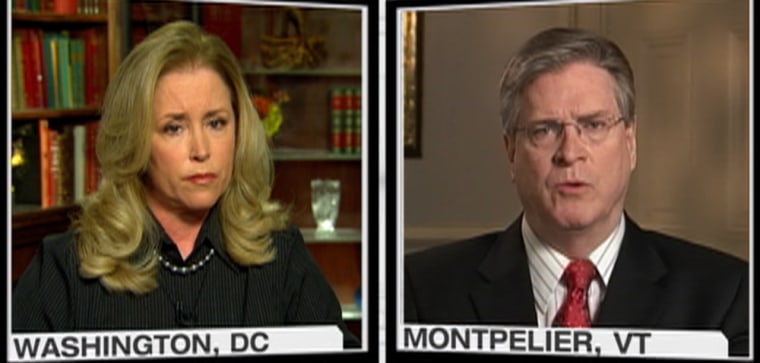Unwilling to force teens to go through life as registered sex offenders because they foolishly used their cell phones and computers to exchange revealing photos of themselves with friends, state legislators in Vermont are moving to decriminalize the practice known as “sexting.”
“We have to understand that there is certainly a difference between bad behavior and bad decision making and criminal behavior,” Vermont State Sen. John Campbell told TODAY’s Meredith Vieira Wednesday from the state capital in Montpelier.
As Vermont’s and most states’ laws are written, there is no distinction made between pedophiles who possess sexually explicit images of minors and underage teens who consensually exchange images of themselves. As more minors are being prosecuted as adults and being branded sex offenders for life, Vermont is among the first to consider legislation to separate what teens do among themselves from adult crimes.
“It’s extremely important for America to understand is what we’re talking about are children here,” Campbell said. “These are teenagers who make very bad decisions. If a 14-year-old girl decides to send a picture of her breasts to her boyfriend who’s 15, she has just become a transmitter of child pornography and he is in possession of child pornography. And as such, they are now on the lifetime sex-offender registry.”
The impact of that designation is devastating, he said. “We have a child now who, as a registered sex offender, if they’re fortunate enough to get into college and they want to, say, go into a teaching profession, do you think they’re going to be hired as a teacher when they’ve been charged with possession of child pornography? The answer is probably not,” he told Vieira.
Prosecutors around the country have tried various approaches against teenagers who used cell phones, e-mail or social networking Web sites to transmit naughty pictures of themselves.Last month, a 14-year-old New Jersey girl was arrested for posting nude pictures of herself on MySpace. She was charged with child pornography and distribution of child pornography for allegedly posting nearly 30 explicit pictures on the site. But it's likely she'll avoid jail because she's a juvenile, according to a prosecutor handling the case.In Pennsylvania, 17 students involved in distributing photos of nude or scantily clad female classmates accepted a county prosecutor’s offer that their cases would be resolved if they participated in a five-week after-school program on sexual harassment and similar topics. Three

balked and sued in federal court to stop prosecutors from filing charges.In Ohio, a 15-year-old high school girl faced charges for sending racy cell phone photos of herself to classmates. She eventually agreed to a curfew, no cell phone and supervised Internet usage.The proposed legislation in Vermont would decriminalize consensual sexting between kids who are between 13 and 18 years old. Some have objected that the measure would then sanction such behavior.
“I think that is actually giving a mischaracterization to that,” Campbell said. He explained that recent federal legislation has forced states to expand their registries of sex offenders so that they can continue to receive certain federal funds. While looking at how that would affect the state’s citizens, Campbell said, lawmakers found that teens could be branded for life for sexting.
“We found that there were certain instances that we needed to make sure to protect those teenagers who make really bad decisions,” Campbell said. “In doing so, we found that it would be best for us to exclude certain circumstances from prosecution. It would be easy for us to have just walked away and let all these cases be handled by prosecutors, but we believe that it is incumbent upon us as legislators to deal with the issue directly.”
Donna Rice Hughes, an Internet safety expert for the organization Enough Is Enough, joined the discussion, agreeing with Campbell that lifetime punishment does not fit the perceived crime. But she also warned that states shouldn’t be too quick to remove criminal penalties from behavior that can be dangerous. Hughes pointed out that most state laws already give prosecutors the discretion to not prosecute juveniles as adults.
-- The Associated Press contributed to this report